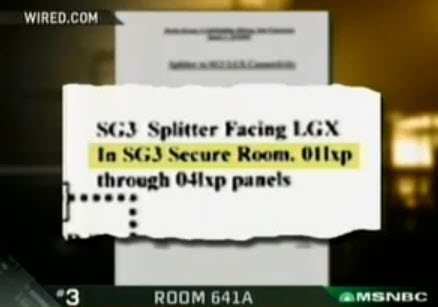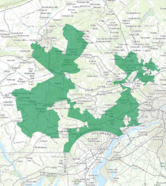Socialism? They Must Be Kidding
Not to be missed (sound on). This is one case where we all really should forward this to everyone we know to get rid of the nonsense we hear about creeping socialism. We are in the midst of the extreme opposite.

Not to be missed (sound on). This is one case where we all really should forward this to everyone we know to get rid of the nonsense we hear about creeping socialism. We are in the midst of the extreme opposite.

The 2008 FISA Amendments Act permits the government to listen in on any of your phone calls and read your e-mail to or from anyone outside the country. In late February, the Supreme Court ruled that, if you object to this invasion of your privacy, if you find it a “search and seizure” violation of the 4th Amendment, you are denied any recourse of challenging the government in court.
The plaintiffs in the case — an alliance of human rights groups, journalists, lawyers and academics — argued that eavesdropping by the state could impair their work by compromising confidentiality, thus closing off contact with those outside the U.S. who know they are being spied upon.
The Court’s answer? catch-22 meets 1984
Originating with the Bush administration and made standard procedure under Obama, the government and the like-minded Supreme Court have developed a reliable tactic to assure that the government may continue unimpeded and do as it chooses, often in total secrecy. The Court has repeatedly ruled that plaintiffs do not have “standing” to sue. In the case just decided, they cannot prove they have been damaged or deprived of rights by the government’s surveillance because they are prevented by government secrecy from acquiring the proof that they have been targeted by surveillance.
In the majority opinion, joined by Justices Roberts, Scalia, Thomas and Kennedy, Justice Alito wrote that because the plaintiffs “have no actual knowledge of the Government’s … targeting practices”, they “merely speculate” that they may be targeted and, besides, the law “at most authorizes” surveillance; it doesn’t mandate it. In other words, Alito asks us to consider that there may be little or possibly even no surveillance going on. And secrecy sees to it that a litigant has no ability to prove otherwise.
By extension, we can expect that secrecy will prevent anyone from ever having standing to challenge the law and we see a Supreme Court that refuses to review the highly questionable constitutionality of a law of such dubious provenance that it was given birth to paper over the illegal wiretapping of the Bush administration.
The 1978 FISA law (the Foreign Intelligence Surveillance Act) had established a separate court from which the intelligence agencies were required to obtain warrants to wiretap suspect citizens’ communications with contacts outside the U.S. Beginning right after 9/11, the Bush administration decided it couldn’t be bothered with such encumbrances and began in secret to eavesdrop on supposedly international communications without warrants or any oversight.
A 2005 Pulitzer-winning investigation by two reporters at The New York Times exposed the illegal Bush spying. 
A year later, newly retired AT&T technician Mark Klein revealed that the NSA had its own room at AT&T in San Francisco that received a splitter feed of every fiber-optic signal routed through its facilities — not just AT&T’s, but virtually those of all other telecom and internet companies. Klein knows because it was he who hooked up the connections.
Following up on that lead, USA Today reported that same year that MCI, AT&T and Sprint had all been granting “access to their systems without warrants or court orders”.
Rather than leading to prosecutions and impeachment, the ongoing post-9/11 panic resulted in the opposite: an after-the-fact blessing by Congress of all the misdeeds of the Bush government by passage of the FISA Amendment law of 2008, which immunized the telecommunication companies from prosecution and effectively scuttled the 1978 FISA law by no longer requiring the government to obtain warrants for its wiretaps.. Written by Vice President Dick Cheney and Senate Intelligence Committee Chair Jay Rockefeller, it gave the government greatly expanded powers to spy on the American people, paying no heed to the 4th Amendment.
obama aboard
In the primary campaign of 2008, Senator Barack Obama had pledged to filibuster against any pardon of the telecoms for surrendering the private data of citizens. But once nominated, not only did he fail to filibuster, he voted against other senators who moved to do so, and even voted for the bill itself, disingenuously saying that he was disappointed it did not “resolve all of the concerns that we have about President Bush’s abuse of executive power”.
Save for torture, or so we are told, Obama would go on to perpetuate all of the Bush policies of spying, rendition, a hugely expanded and controversial drone war that his administration will not even admit exists, and a surveillance program grown to Brobdignagian scale.
At the end of last year, facing expiration, the FISA warrantless intercept law came up for extension in the Senate. The mildest of amendments, such as that proposed by Sen. Ron Wyden (D, Or) that sought only to require that the National Security Agency (NSA) report approximately how many Americans are being targeted, were voted down. President Obama had demanded passage of a “clean” bill with no amendments. He was backed by Senate Intelligence Committee chair Dianne Feinstein (D, Ca), entirely taken in by the government’s position that the public should be kept in the dark, and given to diatribes against fellow senators for proposing amendments would lead to “another 9/11”.
Thus did Obama get his way. The 2008 law was extended for another five years without a word of moderation and signed by Obama on 30 December. It kept company with another signing the next day of the despotic National Defense Authorization Act which allows the president incarcerate in military prisons without trial Americans merely suspected of terrorist connections.
how wide is the net cast?
The government assures us that only international communications relevant to terrorism are being monitored as the FISA Act prescribes, but those close to the facts, such as Michelle Richardson, legislative counsel of the ACLU, one of the plaintiffs in the Supreme Court case, assumes that essentially every call or e-mail sent abroad is vacuumed up. She said to The Huffington Post, “We think it’s exponentially worse than any other wiretapping program because they are allowed [emphasis added] to do bulk collection and programmatic collection”. Whatever is allowed will be used … and abused.
NSA whistleblowers have for years been trying to alert the public to surveillance that dwarfs Ms Richardson’s notions of worst wiretapping program because, quite apart from the FISA Act that nominally restricts eavesdropping to international traffic, the NSA has turned its surveillance eyes and ears on the U.S. and its citizens. Principal among those trying to make the public aware of what is happening is William Binney, a 32-year veteran of the NSA who left in disgust in 2001 but says he continues to have close contacts within the agency. “The Court is not living up to its oath to protect the Constitution” and the NSA is “violating the entire foundation of this country”, he said in an interview, and in his view the violations have gotten worse under Obama.
Binney and others suspect that there are NSA collection points dotted around the nation, such as the “NSA room” at the San Francisco AT&T switching center. He says that, emboldened by the enormous gains in storage technology, the NSA decided not to bother with the filtering protocols that Binney himself had devised when at the agency, but rather to simply collect everything — every e-mail, every cell and landline phone call, every credit card billing record, Facebook post, Twitter tweet and Google search of everyone in the country. To warehouse all the collected data, NSA is building a massive complex in a remote town in Utah named Bluffdale, scheduled for completion this September.

The NSA complex at Bluffdale, Utah. Photo by “name withheld”.
Binney, who says he was visited by the FBI at gunpoint, estimates that the NSA has already captured between 15 and 20 trillion communications, and is preparing to collect on the order of 5,000 exabytes — an exabyte is a 10 with 17 zeroes after it — of data. Wired magazine makes the point that “given the facility’s scale and the fact that a terabyte [1 trillion] of data can now be stored on a flash drive the size of a man’s pinky, the potential
Amendment 4 – Search and Seizure. Ratified 12/15/17 |
The right of the people to be secure in their persons, houses, papers, and effects, against unreasonable searches and seizures, shall not be violated, and no Warrants shall issue, but upon probable cause, supported by Oath or affirmation, and particularly describing the place to be searched, and the persons or things to be seized. ." |
amount of information that could be housed in Bluffdale is truly staggering” and Binney contemplates a day when a yotabyte — a 10 followed by 23 zeroes — of data could be reached.
What use will the NSA put to this Everest of data. Another NSA whistleblower, Russell Tice, says that if you were to use a word like “jihad” in an e-mail to a friend about world affairs, that will pop out of the NSA filters and could (or does) readily prompt its computers to pull up everything you have written, said, posted, tweeted, bought or searched for over the years, and then “graph” the data, their term for spider web like diagrams linking you to everyone you have been in contact with and, extended outward, everyone your contacts have been in contact with.
Yes, but for someone who hasn’t done anything wrong, what’s the harm? Bill Binney again:
If “they have opinions about something that is unacceptable … they become a target without even believing they are, so all the data is being assembled to retroactively examine their entire lives. So it’s not a question of thinking they’re safe because … they don’t believe they’re doing anything wrong. It’s the perception of the administration, not you…to see if you are acceptable on their terms, not yours”.
So we now live in an America where all of us are constantly watched, by the millions of street cams sprouting everywhere and a secret complex in remote Utah, and yet the average American is complacent as the 4th Amendment turns to dust. The Supreme Court has signaled that the FISA Amendment law is insulated from ever coming up for constitutional review. And if the government will never admit to the existence of the NSA program of total surveillance, who can have “standing” in court to strike down this entirely illegal and unconstitutional surveillance.
The government has come up with a parallel world removed from the pesky strictures of the Constitution. It works so well. If they maintain that something does not exist, how could it be violating the Constitution?
In that Wired article Binney held index finger and thumb close together saying, “We are, like, that far from a turnkey totalitarian state”.
In a democracy, citizens get to vote and who gets the most votes, wins. That’s how it’s supposed to work, but that is less and less the case in our heavily compromised “democracy”.
There has always been tampering with the electoral machinery — the practice of reshaping election districts called “gerrymandering” is named for a law signed by governor of Massachusetts back in 1812 — but the last few years have seen concerted campaigns to rig elections and to make voting difficult for targeted groups.
The 2010 census was central to the process. The Constitution calls for apportioning the 435 House seats according to each state’s population. States with populations that, over the decade leading to the decennial census, expanded or shrunk in proportion to other states enough to gain or lose in the number of representatives they may send to Washington, had to change the number of electoral districts to match. That affects all surrounding districts and sets off general state remapping. After 2010, eight states gained, all in the South and West, and ten lost, all Midwest and East Coast (except Louisiana, depleted by Katrina).
But states not affected take advantage of the census, too. It’s open season for the party in power to redraw electoral districts to their advantage.
By 2010, Republicans had taken over the gubernatorial slots in 30 of the 50 states, often with both branches of their legislatures Republican-controlled. The power of redistricting resides with the state legislature, subject to the governor’s signature in most states. They went to work re-drawing the maps, reshuffling to an unprecedented degree.
Once complex enough to limit its use, gerrymandering has become easy with software products like Maptitude developed for the purpose. The task is to pack as many neighborhoods with opposition voters into as few as possible throwaway districts and spread your supporting voters across other districts in such a way that they are a majority in all the rest. The resulting shapes are often tortured, cynical contrivances, good for a rueful laugh.

Florida’s 5th district

Pennsylvania’s 7th district

North Carolina’s 12th district
In 2012, the remapping results were quite spectacular.
• In Wisconsin, the majority of votes for president, the senate and the state legislature were for Democrats, yet Republicans won control of the state legislature and sent 5 Republicans to Congress vs. 3 Democrats.
• Much the same in Pennsylvania: about 83,000 more Democratic votes than Republican yet the delegation sent to Congress is stacked 13-to-5 with Republicans.
• In Virginia, Democratic candidates won almost 50% of the votes but only 27% of congressional seats.
• In Ohio, 48% of the vote went to Democrats but only a quarter of the delegation are of that party.
• North Carolina’s vote for congressional seats went 51% for Democratic candidates. How many took seats in the Capitol? Four Democrats, nine Republicans.
Do Democrats gerrymander? Most certainly — in states such as Illinois and Maryland, where Democrats controlled and got to redraw the maps. But thanks to their 2010 state-level gains just prior to the census, This tally says Republicans controlled redistricting in states with 40% of the seats in the House, whereas Democrats controlled it in states with only 10% of the seats.
Republicans not only had the upper hand, but were organized like no party before to use gerrymandering to control House elections. It was all part of a plan called “Redmap”. Coordinated by the Republican State Leadership Committee with a $30 million budget, it first focused on taking over state legislatures by 2010, and then using that power to redraw the district maps.
The plan worked. A New York Times analysis reported that, “In seven states where Republicans redrew the districts, 16.7 million votes were cast for Republicans and 16.4 million votes were cast for Democrats. This elected 73 Republicans and 34 Democrats”, a stunning outcome. For all 50 states, Democrats held a 1.4 million edge in votes for representatives, yet Republicans still control the House, by a 234 to 201 margin. “This is only the second such reversal since World War II”, says that analysis. By engineering majorities in garrisoned districts, redistricting is chipping away at the fundamental democratic principle that the natural majority decides.
one false move
Creating impregnable districts where one or the other party is guaranteed a safe seat in Congress will have the effect of amplifying polarization to the level of extremism. How? In such a district, the opposition party becomes extinct. Its voters are effectively disenfranchised because their vote counts for nothing. The monopoly party is affected, too. For them, the general election becomes only a formality to anoint whoever wins the primary. To win that primary, a candidate will have to guard every word to make sure he or she is in lock step with party dogma. Once in Washington, facing another primary in less than two years, there can be no variance from the creed, else the zealots will wreak vengeance. Compromise earns a political death sentence. Permanent gridlock is institutionalized. Former Tennessee Representative John Tanner said this to a writer at The Atlantic:
“Look, everyone knows we have a structural deficit, and the only way out of it is to raise revenues and cut entitlements… But what happens? The Democrats look over their left shoulder, and if someone suggests cutting a single clerk out of the Department of Agriculture, they go crazy. Republicans look over their right shoulder, and if someone proposes raising taxes on Donald Trump’s income by $10, they say it’ll be the end of the world. So these poor members come to Washington paralyzed, unable to do what they all know must be done to keep the country from going adrift, for fear that they’ll get primaried.”
We have a new word — “primaried” — meaning a candidate for re-election is sent packing for any deviance from doctrine while in office. So stacked are districts already that Tanner says we are down to less than 100 of the nation’s 435 congressional districts where House members are decided in the general election and not in the primaries.
on to the presidency
Redistricting to freeze out Democrats served Republicans well in keeping control of the House but Obama won the presidency handily owing to the winner-take all practice of states awarding all their electoral votes to the winner of the statewide popular vote. No harm done yet by redistricting to the presidential election considering that Obama got 52% of the vote, almost 5,000,000 more than Romney. But there are proposals in the state legislatures to put an end to the majority deciding who should be president by instead awarding Electoral College votes according to which party wins each district in their state.
Nebraska and Maine already assign their votes this way. If all 50 states had done so, Romney would have beaten Obama 276-262 in the Electoral College. That reversal is what Republican-controlled state houses have their eye on. Legislation being introduced in Michigan would align all but two of its 16 electoral votes with district outcomes, with only the last two awarded to the statewide majority winner.
A Virginia legislator wanted to take it a step further, giving those last two to whichever presidential candidate won the most districts. That scheme would have given Romney 8 electors instead of all 13 going to Obama under winner-take-all. That Obama won the state by a 150,000 margin would have meant nothing. The bill’s sponsor said he “wants to give smaller communities a bigger voice”; that is, give unequal voting power to some and take from others. A new democracy concept. Because cities tend to vote Democratic and are more populous, the district scheme aims to tilt the playing field toward rural communities, which tend to vote Republican, and away from the majority deciding who wins. We saw how that succeeded in the redistricting examples above.
Moves are afoot in Florida, Ohio, Pennsylvania and Wisconsin to switch to district-based awarding of electors as a way to see to it that Romney’s equivalent wins next time, no matter the majority vote.
voting impediments
Republicans conducted a parallel campaign to make it difficult for certain groups to vote in the 2012 election. Laws requiring that voters identify themselves by government-issued documents with photos, no matter how long a person had been on the voting rolls, drew the most attention because they were premised on a lie: they were to combat non-existent “voter fraud”. We covered this in these three pieces last year that mocked how silly voter fraud is as a way to derail an election’s results even if it did exist. Of course the real intent was to deter blacks, Latinos and students from voting — three groups that traditionally vote Democratic — by making it problematic for lower income people to get time off from jobs, sacrificing pay, and likely having to pay for the ID, which amounted to the return of a poll tax. The effect was to dissuade hundreds of thousands of American citizens from exercising their right to vote, but that sure stopped bogus voter fraud dead in its tracks.
Other obstacles to that most basic right in a democracy were shortened early voting periods; wholesale removal of citizens from voting rolls; long waits to vote, particularly by allocating too few voting machines in Democratic city districts, allegedly designed to make people quit; and tactics such as Florida’s forbidding voter registration on Sundays, when African-Americans have traditionally conducted registration drives after church services.
It’s a different morning in America. Changes in laws in states across the country, now in place, will take years to extricate, and there is no sign of any counter-movement to do so. That leaves us with a phony democracy contrived to make sure the next time around that Republicans will continue to hold the House, will win the presidency and possibly the Senate no matter which party gets the majority of votes. And it doesn’t even cover what possibly will be the biggest change of all coming down the road as the Supreme Court considers the 1965 Voting Rights Act. For that, see this companion story.